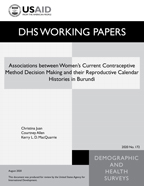There is no printed copy available to order.
Abstract:
In a recent study of contraceptive calendar data from Demographic and Health Surveys (DHS) in Burundi and Nepal, the researchers created clusters of women based on their contraceptive behavior and pregnancy experiences over a 5-year calendar period (MacQuarrie, Juan, Allen, Zweimueller, and Gemmill 2019). In Burundi, the following six contraceptive clusters were created: Quiet Calendar, Family Builder 1, Family Builder 2, Modern Mother, Consistently Covered Mother, and Traditional Mother.
Here, we carried out multivariable, multinomial logistic regression analysis to examine the associations of these clusters with current decision-making power to use or not use contraception. We also examined how other important factors, including experiences of marital control in terms of suspicion and isolation, intimate partner violence, employment status, fertility intentions, exposure to family planning messages, and family planning discussions with a health provider in a health facility may impact women’s current contraceptive decision-making behaviors, after accounting for their 5-year reproductive calendar histories.
We found that women in three of the six clusters—Family Builder 1, Modern Mother, and Consistently Covered Mother—had higher relative risks of deciding jointly whether or not to use contraception with their partners or husbands than of not making a decision about contraception, when compared with women in the Quiet Calendar cluster. Our findings suggest that using clusters based on patterns of key events in a woman’s reproductive life gives greater insight into her reproductive journey and into the effects of those patterns on her current ability to make decisions—either jointly or solely—for her health and well-being.
 Associations between Women's Current Contraceptive Method Decision Making and their Reproductive Calendar Histories in Burundi (PDF, 2318K)
Associations between Women's Current Contraceptive Method Decision Making and their Reproductive Calendar Histories in Burundi (PDF, 2318K)
